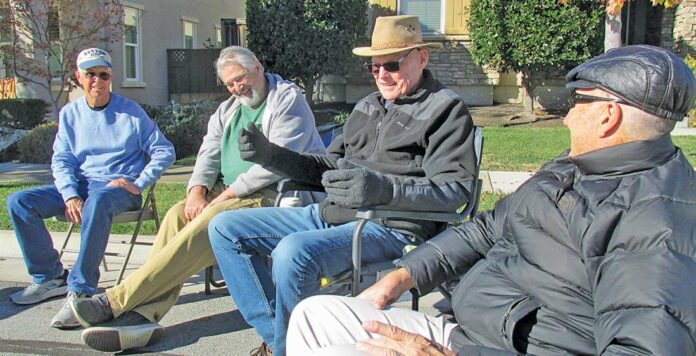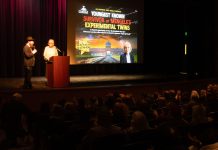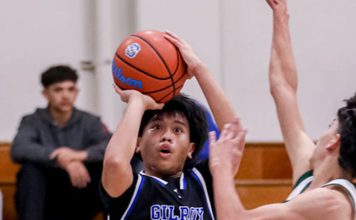
It’s another Thursday morning, which means another meeting of the minds as the Trash Talk group takes to the street, lawn chairs in hand.
Since early in the pandemic these gentlemen found a way to stay connected, gathering on Thursday mornings in their Gilroy neighborhood—trash day—for a weekly get-together. Their connection to one another could be credited to the proximity they have to one another, but they share a much stronger bond. These men are all veterans, and each has a story.
Bill Scheid, 78, after completing two years in ROTC at Santa Clara University, joined the army and was stationed two years in Vietnam where he worked for a project called Nation Building, transferring signal facilities to Vietnamese towns and cities.
When he left the service in 1970, he began his career as an electrical engineer at Intel.
“Turned out I was employee 163,” Scheid said, with a smile.
Working in quality and reliability he found no one listened to the online operators working with the equipment. So, Scheid did something about it.
“I went directly to them to get their input,” he said. “I’ve always liked helping people in a variety of different tasks.”
Throughout his years at the semiconductor chip manufacturer, he helped implement the infrastructure for certification of the parts they made to be used by the military. Scheid chose an early retirement to join his wife, Lynn, in her volunteer work with the local church and schools.
“It was very gratifying seeing people enjoy that interaction,” Scheid said, adding she was the key reason everyone in the neighborhood became connected.
She took on the role of Welcome Lady when new families moved in, inviting them to neighborhood Bunco games.
“My wife really is incredible,” Scheid said. “That’s how we started meeting everybody.”
Leo Menestrina, 80, also served in ROTC before joining the Air Force where he served from 1962 to 1966, working in the security service.
“I was a spy,” Menestrina said, with a smirk. “My official title was a voice processing intercept specialist.”
After leaving the Air Force he graduated from Maryland University with a degree in electrical engineering. As the group’s self-proclaimed rebel, he readily admits he didn’t work well in the corporate environment. He bounced around a bit working on flight simulators at Singer Link, and anti-submarine warfare simulations at Moffett Field. By the time of his retirement, he’d settled down a bit, having accrued 25 years at Lockheed Martin.
“I’ve launched rockets to the moon, worked on nuclear power plant simulators, I’ve been all over the place,” Menestrina said.
In his down time, he took up cycling. After competing in the Japan Town classic, and winning, he was hooked. Then he discovered Hellyer Park’s velodrome track, a specially designed track for cycling.
“I hold the record for the United States 75-year olds’ fastest flying 250 meters on a bike,” Menestrina said, adding, “with no brakes.”
He also holds the title of World Masters Pursuit Champion and the 500-meter champion. Although Menestrina no longer competes, he still rides for fun.
“I’m completely bionic, two bionic knees, two knee replacements, a pacemaker, and I got my arteries replumbed,” he said.
Steve Fieler, 68, joined the Air Force in 1972 and was stationed in Thailand for four years. His work consisted of repairing computers that scrambled and encrypted communications.
“I worked inside a communication center where all variety of things came through, including top-secret information,” Fieler said.
After the Air Force he continued in IT, including teaching computer classes. At the time of his retirement, he’d risen to the title of director at McAfee.
“Whenever somebody got hacked and you’d see it in the press, my group would be the ones trying to figure it out, trying to prevent it from happening in the future,” Fieler said.
It was his role as teacher, in particular a student from Malaysia, that made the biggest impact in Fieler’s life.
“He was a bit, ‘unqualified,’ for the classes,” Fieler recalls. “But I spent extra time before class, at lunch, and after class giving him the tutoring he needed so he could get a job.”
Five years later, that student returned to Fieler’s office and handed him a plaque, saying, “You changed my life. You saved my parents, my family, and my children.”
“That’s my proudest moment,” Fieler said, as a tear slid down his cheek. “You never know how many people you touch in your life with a simple act of kindness.”
Mike Nohelty, 79, enlisted in the Air Force in 1960 and spent four years in France working in accounting. During his time there he traveled extensively, including a trip to East Berlin which he considers a highlight of his military years.
Upon leaving the military, Nohelty continued in the field of accounting working for a variety of companies, including Atari, which he said was a lot of fun. At the age of 64 he changed career paths and became a personal trainer, gravitating to assisting individuals with disabilities.
“These are people with severe physical disabilities that needed a completely specialized training routine, and Mike researched it and came up with one,” Scheid boasted of his neighbor and friend.
For Nohelty, one client still stands out, a young man, 30 years old, stricken with a form of mitochondria.
“He was a great kid,” Nohelty said, tears welling. “He couldn’t walk or stand very long and to measure his balance activity he had to stand on this piece of equipment for two minutes. The day he made the two-minute mark was probably the proudest moment of my career. He was such an inspiration. He made such a difference in my life.”
These are the men of the Trash Talk group, and their weekly gatherings continue, each sharing their wisdom, their help, and a good dad joke just for fun. If you happen to come across these distinguished gentlemen gathered in the street, stop by, say hello, and ask them to tell you a story. That’s what I did.















Your feature story (11/10/22) on the trash talk group was so inspirational and brought tears. I believe it’s vital that we keep these stories alive and connect the generations. If I were still teaching I would invite them for a sit-down in my classroom to help raise student awareness of and appreciation for the foundation on which they stand. I would love to read more stories like this.